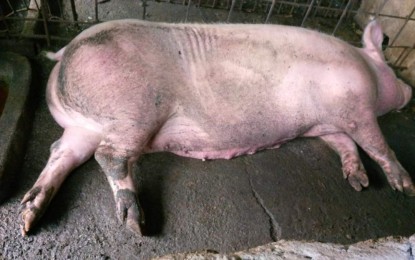
ASF VAX. A hog infected by African swine fever (ASF) disease dies in San Jose de Buenavista, Antique on July 11, 2023. Camarines Sur Rep. Luis Raymund Villafuerte Jr. said on Friday (Aug. 18, 2023) that the Food and Drug Administration and Bureau of Animal Industry should speed up the accreditation and purchase of vaccines already proven effective against ASF. (PNA photo courtesy of Gali Magbanua)
MANILA – A lawmaker on Friday called on the Food and Drug Administration (FDA) and the Bureau of Animal Industry (BAI) to speed up the accreditation and purchase of vaccines already proven effective against African swine fever (ASF).
Camarines Sur Rep. Luis Raymund Villafuerte Jr. said the FDA needs to expedite the registration process for the local commercial use of the Vietnamese-made vaccine AVAC, which President Ferdinand R. Marcos Jr. said has been proven 80 percent effective against ASF.
Villafuerte said the BAI has to accelerate its acquisition of the shots as soon as the drug is accredited by the FDA and implement the inoculation program nationwide.
“The FDA and BAI need to hit the gas with this vaccination drive to put an end to the wholesale deaths and selective slaughter of hogs, allow swine raisers to recover and repopulate their farms or backyards, and eventually stabilize the supply and cost of pork products in the local market,” Villafuerte said.
He said "speed is of the essence" in this mass vaccination plan given that BAI officials have said that the Vietnamese supplier has committed 600,000 doses only for the Philippines for 2023 "against the backdrop of many other countries also wanting to procure their own anti-ASF shots at the soonest.”
In July, President Marcos stressed the “urgent need” to revitalize the livestock and poultry industries in pursuit of food security and global competitiveness.
Marcos also emphasized the importance of detecting and preventing the spread of ASF and avian influenza.
Villafuerte noted that such animal diseases have drastically reduced domestic stocks and caused increase in the retail prices of pork and chicken products.
Dr. Janice Garcia, cluster coordinator of the National ASF Prevention and Control Program of the BAI, has reported that as of June 1, there are 15 provinces that have active ASF cases.
As of this month, Amanel Manalo of the BAI also reported that they already completed Phase 1 of the trial testing with results showing at least 80 percent of the animals producing antibodies 28 days post-vaccination.
Manalo also reported that they have ongoing trials for Phase 2 in Batangas, Quezon, and Pangasinan which will run until September this year.
Meanwhile, the Committee endorsed a policy resolution to the DA, through BAI, the recommendations from the Retrospective Study on the Epidemiology of African Swine Fever Outbreaks in the Philippines.
The study was commissioned by the Philippine Council for Agriculture and Fisheries to the Agricultural Training Institute-International Training Center on Pig Husbandry (ATI-ITCPH) to evaluate and identify the risk factors involved with the occurrence and spread of the virus.
It also assessed the effectiveness of the National Zoning Plan and the control measures implemented by the national and local governments for the development of relevant and effective policy recommendations on ASF control and prevention. (PNA)
